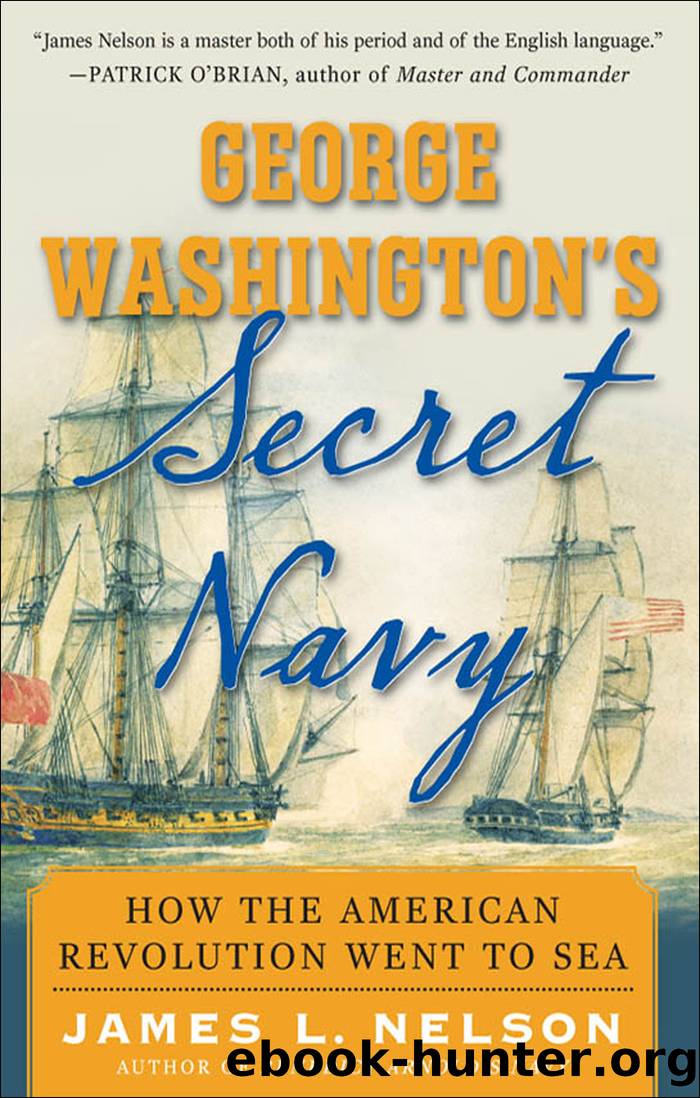George Washington's Secret Navy by James L. Nelson

Author:James L. Nelson
Language: eng
Format: epub
Publisher: McGraw-Hill Education
Published: 2008-06-14T16:00:00+00:00
Polly carried twenty cords of firewood, seven horned cattle, eight sheep, and fifteen hogs along with potatoes, turnips, hay, fish, cheese, butter, and sundry fowl. Industry carried another twenty cords of wood along with livestock and vegetables. As with so many of the prizes taken by Washington's fleet, the captured goods made a nice addition to the Americans' supplies but, more to the point, were a dire loss to the British in Boston.
According to one account, Coit did not miss the opportunity to have some fun. "Capt. Coit (a humorous genius)," wrote a correspondent in Roxbury, "made the prisoners land on the same rock our ancestors first trode when they landed in America, where they gave three cheers, and wished success to American arms."
Harrison's lieutenant, Henry Champion, was dispatched to Cambridge to carry the good news to headquarters. Unfortunately he managed to quash any enthusiasm Washington might have felt by accidentally spilling candle wax on a letter the commander-in-chief was about to send to Joseph Reed. "I had just finished my Letter when a blundering Lieutt, of the blundering Captn Coit, who just blunderd upon two Vessels for Nova Scotia . . . pickd up a Candle, & sprinkled it with Grease." This was certainly an unfair characterization of the first captain in his fleet to make an unambiguous capture of two enemy supply vessels. Washington added, "but these are [the] kind of Blunders which one can easily excuse."
Unfortunately, Coit's brief cruise revealed a problem with Harrison that went beyond age and weakness. "Capt Coits mainmast Proves too rotten for the Service," Bowen reported the day Coit returned with his prizes, adding that he had "got another making so don't expect he will Sail again until tomorrow night."
Having had a sea trial in Harrison, Coit thought even less of her, and he expressed his opinion in his inimitable style to his friend Major Samuel B. Webb, aide-de-camp to General Israel Putnam:
To see me strutting about on the quarter-deck of my schooner!—for she has a quarter-deck—Ah, and more than that too—4 four pounders, brought into this country by the company of Lords Say and Seal, to Say-brook when they first came [1635]. A pair of cohorns that Noah had in the Ark; one of which lacks a touch-hole, having hardened steel drove therein, that she might not be of service to Sir Edmund Andros [1687]—Six swivels, the first that were landed at Plymouth, and never fired since.
Coit was being disingenuous about the cohorn's touch-hole. It might at one point have been without one, but an October 12 bill for Harrison includes the item "Drilling new touch hole in Cowhorn."
The guns, Coit told Webb, were his plague, but the ship herself was his comfort:
My schooner is used to the business, for she was launched in the spring of 1761, and has served two regular apprenticeships to sailing, and sails quick, being used to it. Her accommodations are fine; five of us in the cabin, and when there, are obliged to stow spoon fashion.
Download
This site does not store any files on its server. We only index and link to content provided by other sites. Please contact the content providers to delete copyright contents if any and email us, we'll remove relevant links or contents immediately.
| Africa | Americas |
| Arctic & Antarctica | Asia |
| Australia & Oceania | Europe |
| Middle East | Russia |
| United States | World |
| Ancient Civilizations | Military |
| Historical Study & Educational Resources |
Making Haste From Babylon(812)
New York Burning by Jill Lepore(740)
Bunker Hill by Nathaniel Philbrick(706)
An Inquiry Into the Nature and Causes of the Wealth of Nations by Adam Smith(687)
Braddock's March by Thomas E. Crocker(684)
Commonwealth Caribbean Criminal Practice and Procedure by Dana S. Seetahal(636)
The City-State of Boston by Mark Peterson(629)
Infamous Scribblers by Eric Burns(610)
America's Revolutionary Mind by C. Bradley Thompson;(583)
John Adams Under Fire: The Founding Father's Fight for Justice in the Boston Massacre Murder Trial by Dan Abrams(582)
The Barbarous Years by Bernard Bailyn(576)
A Land So Strange: The Epic Journey of Cabeza de Vaca by Andre Resendez(570)
The Wealth of Nations Books I-III by Adam Smith(562)
Bunker Hill: A City, a Siege, a Revolution by Nathaniel Philbrick(559)
American Slavery: A Very Short Introduction (Very Short Introductions) by Heather Andrea Williams(541)
White Slavery In Colonial America: And Other Documented Facts Supressed from the Public Know! by Dee Masterson(537)
The First American by H.W. Brands(536)
The Barbarous Years: The Peopling of British North America: The Conflict of Civilizations, 1600-1675 by Bernard Bailyn(503)
George Washington by John Rhodehamel(503)
